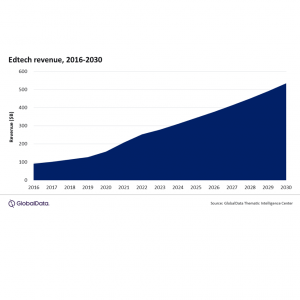Actualizado el 01/03/2026
GlobalData highlights enduring impact of AI on edtech evolutionEscrito por Redacción TNI el 22/02/2024 a las 11:31:191137
 As the educational landscape undergoes a seismic shift propelled by the Coronavirus pandemic, educational technology (edtech) has risen to the forefront, catalyzing a permanent transformation. Artificial intelligence (AI) stands as a cornerstone in this evolution, heralding a new era of personalized and immersive learning experiences. With edtech poised to reach a market value of $535 billion in 2030, its trajectory underscores the enduring impact of AI on education's future, says GlobalData, a leading data and analytics company.
GlobalData’s latest Thematic Intelligence report, Edtech, reveals that Coronaviris was the engine that drove edtech revenue growth of 23% in 2020, with revenues rising to $158 billion. But that exceptionally strong rate has markedly declined in recent years. Between 2022 and 2030, GlobalData expects the edtech industry to grow at a compound annual growth rate (CAGR) of 9.8%.
David Bicknell, Principal Analyst in the Thematic Intelligence team at GlobalData, comments: “Edtech helped re-establish engagement between teachers and their students. The pandemic catalyzed education providers’ adoption of the requisite hardware, software, and services, with millions of students switching to online learning, highlighting the sector’s possibilities to new users and investors. The challenge now for edtech providers and educators is understanding where AI fits into their product, tuition, and assessment mix.”
The medium-term picture remains positive, though several factors impacted edtech adoption post-pandemic and will continue to do so in the near-term. These include changing government policies towards private tutoring in China and challenging economic conditions worldwide, including in India, a keen adopter of edtech, alongside a widespread return to in-class learning.
Overall, the edtech market will continue to grow strongly over the next decade, driven by blended learning, a mix of online and offline services, and the more recent impact of AI, including generative AI.
Bicknell explains: “Coronavirus was the initial driving force for edtech, but the new growth engine will be AI. By 2030, learning will comprise greater immersion, easier access, and increased personalization. Teaching formats will aim to maximize learner engagement and offer more appealing lesson formats. Edtech will simplify administrative tasks and provide access to learning resources, and education will move from a one-size-fits-all approach to individually tailored learning. AI will play a significant role in all these trends.
“The still-emerging capabilities of generative AI could boost the existing use cases and open the door to new ones. Use cases for generative AI in education include designing and organizing course materials, syllabi, lesson plans, and assessments.
“It can also help personalize course material, such aspractice problems or interactive exercises, based on students’ knowledge gaps, skills, and learning styles. Generative AI can also assist with creating new teaching materials, such as questions for quizzes and exercises or explanations and summaries of concepts.”
The growth of edtech has been international, led initially by the US, China, and India. But China’s edtech industry has suffered under government regulation, while India’s has suffered significant job losses.
Bicknell continues: “From the start of the edtech revolution, the driving forces were startups and private companies in China, India, and the US. Investors backed China’s after-school tuition companies but had their fingers burned when the government intervened to stop incessant advertising and spiraling tutoring prices that had squeezed household budgets.
“Tough regulations require tutoring companies to be nonprofit, effectively barring foreign investment. Some investments earmarked for China switched to India, but high interest rates and a tightening economic picture worldwide reduced valuations and closed the tap on venture capital investment.”
Noticias Relacionadas:Cash Elimination ChatGPT brings concerns about cybersecurity and search engine ranking |